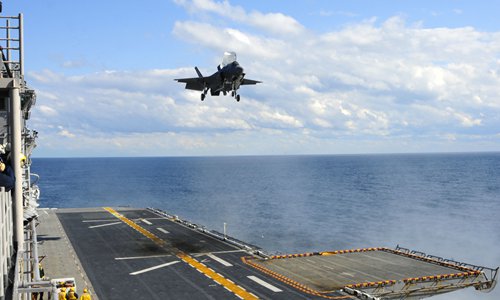
A US F-35B Lightning II makes the first vertical landing on a flight deck at sea aboard the amphibious assault ship USS Wasp (LHD 1) on October 3, 2011. Photo: IC
As China is reportedly building more aircraft carriers and its first group of amphibious assault ships, the People's Liberation Army (PLA) Navy might eventually need its own F-35B-like short takeoff and vertical landing (STOVL) stealth fighter jet to safeguard territorial integrity, Chinese military analysts said on Sunday.
Such warplanes could outperform attack helicopters in landing and island defense missions. Therefore, it would be effective in dealing with potential island disputes, analysts said.
While China has yet to announce any plan, it needs stealth fighter jets for its future aircraft carriers, and has three options: a J-20 variant, an FC-31 variant or a totally new one that might feature STOVL capabilities, Ordnance Industry Science Technology, a Xi'an-based periodical on the national defense industry, said in a Friday article.
A STOVL aircraft can take off from a short runway and land vertically without a runway, with the US' F-35B as an example.
STOVL fighter jets would shine on amphibious assault ships even more than on aircraft carriers. This kind of ship is not designed for a normal fixed-wing fighter jet to take off and land, but a STOVL aircraft can, Wei Dongxu, a Beijing-based military analyst, told the Global Times on Sunday.
China is developing the Type 075 amphibious assault ship, a warship comparable to the US' Wasp and America-class, foreign media reported in May.
In a landing mission, STOVL fighter jets from these ships would be a more efficient choice than helicopters to support amphibious operations, gaining aerial superiority and attacking ground targets, Wei said, noting that they could also be deployed on islands that are not large enough to build proper air fields.
The US has deployed F-35Bs on its amphibious assault ships. Japan is also planning to buy F-35Bs for its Izumo-class aircraft carrier-to-be helicopter destroyers.
But China might still need some time before a STOVL fighter jet is built, military observers said.
If China was to develop such aircraft, it needs to make reliable engines that are capable of not only providing thrust, but also lift, together with lift-providing devices in the middle of the aircraft, like lift fans, Wei said, noting that flight control systems could also be very complicated.
Once developed, the STOVL fighter jet could make an amphibious assault ship a light aircraft carrier and play unique roles in protecting islands and safeguarding China's territorial integrity, Wei pointed out.
Secessionist forces in Taiwan are still taking the chance that the mainland's amphibious combat capabilities could be insufficient to reunify Taiwan by force. But once the mainland has amphibious assault ships with STOVL warplanes, it may become a strong deterrent against Taiwan secessionists and help solve questions involved with Taiwan, analysts said.













